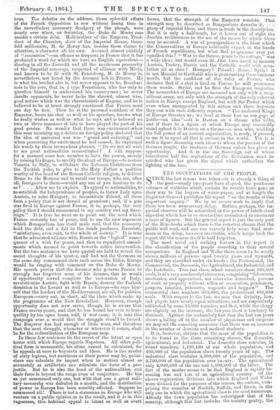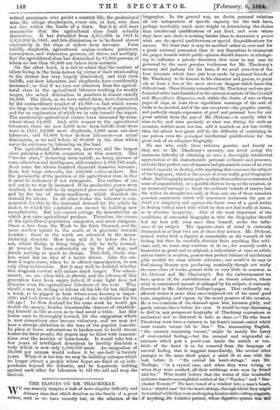THE OCCUPATIONS OF THE PEOPLE.
SINCE the last census was taken—it is already a thing of the past—nearly two years have elapsed, the ponderous volumes of statistics which contain its results have gone on their way to the buyers of waste-paper, and at length the Registrar-General publishes his report "on the results of this important inquiry." We by no means wish to imply that there has been unnecessary delay. Rather, perhaps, the im- partial observer will be astonished at the power of intellectual digestion which has in so short a time assimilated so enormous a mass of figures. But the general report is just the only part of the Blue-books which there is the remotest chance that the public will read, and one can scarcely help some fond mur- murs at the delay, however inevitable, which keeps back the report till the census itself is half forgotten.
The most novel and striking feature in the report is the classification of the people according to their several occupations. In England and Wales there seem to be nearly eleven millions of persons aged twenty years and upwards, and they are classified under six heads ; the Professional, the Commercial, the Domestic, the Agricultural, the Industrial, and the Indefinite. This last class, which numbers about 600,000 souls, is of a very nondescript character, comprising "labourers, mechanics, and apprentices, not otherwise described, persons of rank or property without office or occupation, pensioners, paupers, lunatics, prisoners, vagrants and beggars." The commercial class numbers 500,000, the professional 400,000 souls. With respect to the last, we note that divinity, law, and physic have nearly equal attractions, and are respectively cultivated by some 35,000 votaries; and that, while the clergy are slightly on the increase, the lawyers show a tendency to diminish. Against the melancholy fact that the last ten years shows s, fulling off in the number of physicians and surgeons we may set the consoling assurance that there was an increase in the number of dentists and medical students.
It is, however, obvious that the mass of the population is to be found in the three remaining classes, the domestic, agricultural, and industrial. The domestic class contains, in round numbers, 1,100,100 of our whole population, and 400,000 of the population above twenty years of age. The industrial class contains 4,800,000 of the population, and 3,700,000 of the population over twenty. The agricultural only 2,000,000 of the one and 1,600,000 of the latter. The fact of the matter seems to be that England is rapidly be- coming less and less of an agricultural country. Of the eleven registration divisions into which England and Wales were divided for the purposes of the census, the eastern, com- prising the counties of Norfolk, Suffolk, and Essex, is the only one in which the agricultural class is the most numerous. Already the town population has outstripped that of the country, although this last includes the country gentry, the
retired annuitants who prefer a country life, the professional men, the village shopkeepers, every one, in fact, who does not live within the limits of a town. But it is still more remarkable that the agricultural class itself actually diminiahes. It has dwindled from 2,011,000 in 1851 to 1,924,000 in 1861, and this diminution is to be found almost exclusively in the class of indoor farm servants. Farm bailiffs, shepherds, agricultural engine-workers, gardeners, nurserymen, and watercress growers, all thrive and multiply. But the agricultural class has diminished by 87,000 persons, of whom no less than 83,000 are indoor farm servants.
On the other hand, it is fair to admit that the number of idlers living in the farm-houses by virtue of their relationship to the farmer has very largely diminished, and that farm bailiffs, out-door labourers, and shepherds, have considerably increased ; so that if we turn our attention from the agricul- tural class to the agricultural labourer working for weekly wages, the actual diminution in numbers is almost exactly 60,000. The idlers, as we have called them, have diminished by the extraordinary number of 41,000—a fact which seems too large to be accounted for by a better system of registration, and for an explanation of which we in vain consult the report. The nondescript agricultural classes have increased by some- where about 14,000. And, with respect to the agricultural labourers, there are now 5,000 more farm bailiffs than there were in 1851, 13,000 more shepherds, 5,000 more out-door labourers, and 83,000 fewer in-door labourers—an actual diminution, as we said before, of 60,000 in the class which earns its existence by labouring on the land.
The agricultural labourers are, however, still the largest class pursuing a definite occupation in this country. This " bovine class," deducting farm-bailiffs as being persons of some education and intelligence, still numbers 1,188,789 souls. Next come the eleven hundred thousand domestic servants ; then, but longo intervallo, the 456,000 calico-makers. But the peculiarity of the position of the agricultural class is that it must be stationary if not retrograde. The surface of the soil can in no way be increased. If its productive power-were doubled, it must still be by improved processes of agriculture and by the use of steam-machinery, which diminish the demand for labour. In all other trades the labourer is com- pensated for this by the increased demand for the article he makes, to which the capitalist can answer by building new manufactories. But you cannot enlarge the manufactory on which you raise agricultural produce. Therefore, the excess of the agricultural population emigrates, and must emigrate. Draw a line from the Wash to the Irish Channel, and the more restless spirits to the south of it gravitate towards London ; those to the north are attracted to the manu- facturing districts: How long will it be before the les- son, which Hodge is being taught, will be fully learned. At present he lives contentedly on in the old way, and dreads nothing so much as change. That dull, blank, aim- less mind has no idea of a better future. Like the em- bruted negro-slave, when he is offered emancipation, he can only cling to his cabin. But it may well be doubted whether this stagnant content will endure much longer. The school- master, we are often told, is abroad, and the labours of this generation have been empty indeed, if some light does not illumine even the agricultural labourers of the next. Why should a man be willing to labour all his life for ten shillings a week, to be pigged in huts where even decency is impos- sible, and look forward to the refuge of the workhouse for his old age ? In New Zealand for the same work he would get double the money, besides innumerable chances of establish- ing himself in life as soon as he had saved a little. Let this lesson once be thoroughly learned, let the emigration which is now compulsory once become voluntary, and we may yet hear a strange alteration in the tone of the popular laments. In place of fierce exhortations to landowners to build decent homes for their people, the papers may be filled with lamenta- tions over the scarcity of farm-hands. It would take but a few years of intelligent discontent to terribly diminish a body which is now only 1,188,789 souls. An emigration of 30,000 per annum would reduce it by one-half in twenty years. When it is too late we may be building cottages which no longer attract a people whose hopes are fixed on an inde- pendence beyond the Atlantic, and be hopelessly bidding against each other for labourers to till the soil and reap the harvest.

































 Previous page
Previous page